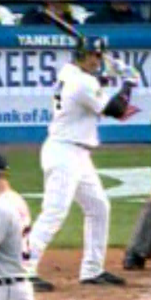Robinson Cano was one of the Yanks’ great disappointments this year. Coming off of two strong campaigns in 2006 and 2007, Cano had a terrible start to the year and ended up hitting just. 271/.305/.410. As Joe explored earlier this week, Cano’s troubles were a key factor in the Yanks’ missing the playoffs.
Of course, as is the norm in New York, as soon as a player struggles, they are automatically the subject of multiple trade rumors, no matter how ludicrous. While the Yanks have shown no indication that they would shop Cano and while 29 other teams are gleefully wondering if the Yanks are stupid enough to sell low on Cano, this reality isn’t stopping anyone from thinking out loud about trading Robinson Cano.
Today’s backhanded efforts at slamming Cano come to us from RAB whipping boy and New York Post scribe Joel Sherman. He seemingly questions why the Yanks are valuing Cano not at 2008 but at 2006-2007 levels:
The more I talk to Yankee officials the more I become convinced that Robinson Cano Robinson Cano will not be dealt. That is because the Yanks plan on valuing him as the 2006-7 Cano and not last year’s discouraging version. As I canvas executives from other teams, however, they all say something like this: “Cano still has value, but not the same as last year.”
So unless this is a leverage play the Yankees New York Yankees are not going to be able to turn Cano into either the top-end starter or center fielder they crave. Essentially outside teams want to hedge the risk that Cano is not a serious enough person to ever consistently maximize his talent. So what would be most possible would be a risk-for-risk trade, and the Yanks don’t want to take that risk. Enough of their top decision makers continue to believe Cano is going to be a .300-plus hitter who hits between 20-30 HRs and approaches Gold Glove defense to give him up for a project.
Why this would be a surprise to Sherman or any nameless executives is beyond me.
For all of his perceived struggles in 2008, Cano’s numbers break down nicely, in a way. On May 3, Cano bottomed out at .150/.213/.230. Over the rest of this season, his numbers were nearly in line with his 2007 level. From May 4 until the end of the year, Cano came to bat 512 times and hit .300/.327/.452 with 12 home runs, 32 doubles, three triples and 65 RBI. Much as we look at Melky Cabrera’s last four months for a better indication of his overall failures in 2008 so can we look at those numbers for Cano.
Furthremore, some of Cano’s numbers indicate that he was woefully unlucky this year. According to The Hardball Times, Cano’s line drive percentage was actually higher in 2008 than it was in 2007, and he cut his groundball rate at the same time. His BABIP, however, dropped a stunning .050 points. For all his troubles, Cano could have just been unlucky this year.
Now, there are some warning signs, and I could see why the Yanks’ potential trading partners would be wary of Cano. As with Cabrera, Cano’s rate stats have declined in each of the last three seasons. He hasn’t developed the batting eye or patience at the plate that the Yanks would like to see him develop. But he is far from a lost cause as a mid-September adjustment to his batting stance seemed to deliver promising results.
Right now, the Yanks have no real reason to trade Robinson Cano. The youngest of the Yankees’ every-day players, he fills an important position and has the potential to be one of the AL’s best hitters. He’s cost-controlled and can play solid defense. With only Orlando Hudson as a viable free agent alternative, the Yanks, in trading Cano, would be opening up one hole while potentially filling another, if they could even land a premier Major League center fielder or pitcher.
As is often the case, this focus on Cano and his supposed tradeability is all about the media. They see something they don’t like — Cano’s .271 average, in this case — and this all of a sudden means he can’t make it in New York. Let’s not lose perspective here.

